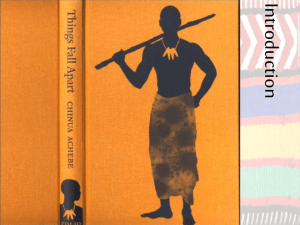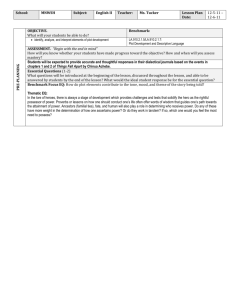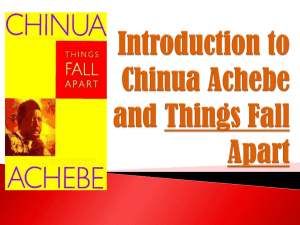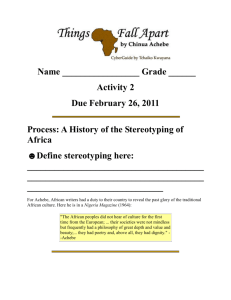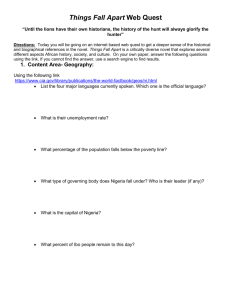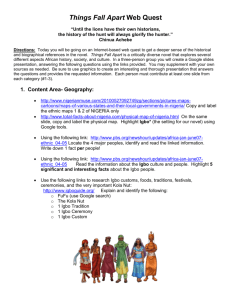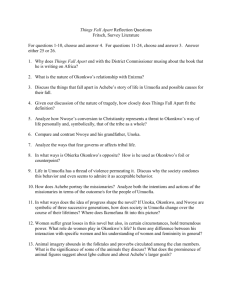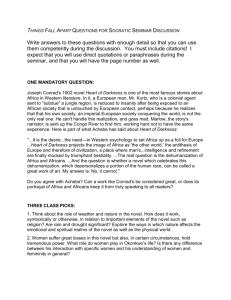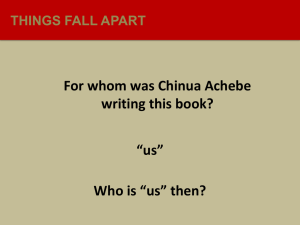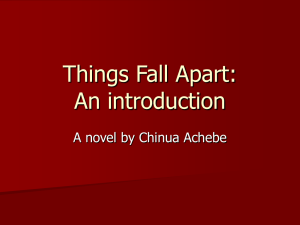Things Fall Apart: Main Issues for Reflection
advertisement
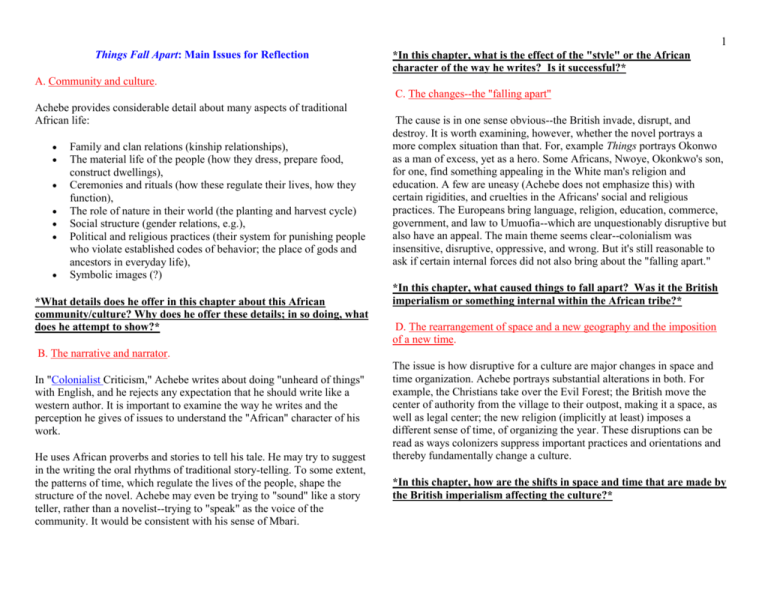
1 Things Fall Apart: Main Issues for Reflection *In this chapter, what is the effect of the "style" or the African character of the way he writes? Is it successful?* A. Community and culture. C. The changes--the "falling apart" Achebe provides considerable detail about many aspects of traditional African life: Family and clan relations (kinship relationships), The material life of the people (how they dress, prepare food, construct dwellings), Ceremonies and rituals (how these regulate their lives, how they function), The role of nature in their world (the planting and harvest cycle) Social structure (gender relations, e.g.), Political and religious practices (their system for punishing people who violate established codes of behavior; the place of gods and ancestors in everyday life), Symbolic images (?) *What details does he offer in this chapter about this African community/culture? Why does he offer these details; in so doing, what does he attempt to show?* The cause is in one sense obvious--the British invade, disrupt, and destroy. It is worth examining, however, whether the novel portrays a more complex situation than that. For, example Things portrays Okonwo as a man of excess, yet as a hero. Some Africans, Nwoye, Okonkwo's son, for one, find something appealing in the White man's religion and education. A few are uneasy (Achebe does not emphasize this) with certain rigidities, and cruelties in the Africans' social and religious practices. The Europeans bring language, religion, education, commerce, government, and law to Umuofia--which are unquestionably disruptive but also have an appeal. The main theme seems clear--colonialism was insensitive, disruptive, oppressive, and wrong. But it's still reasonable to ask if certain internal forces did not also bring about the "falling apart." *In this chapter, what caused things to fall apart? Was it the British imperialism or something internal within the African tribe?* D. The rearrangement of space and a new geography and the imposition of a new time. B. The narrative and narrator. In "Colonialist Criticism," Achebe writes about doing "unheard of things" with English, and he rejects any expectation that he should write like a western author. It is important to examine the way he writes and the perception he gives of issues to understand the "African" character of his work. He uses African proverbs and stories to tell his tale. He may try to suggest in the writing the oral rhythms of traditional story-telling. To some extent, the patterns of time, which regulate the lives of the people, shape the structure of the novel. Achebe may even be trying to "sound" like a story teller, rather than a novelist--trying to "speak" as the voice of the community. It would be consistent with his sense of Mbari. The issue is how disruptive for a culture are major changes in space and time organization. Achebe portrays substantial alterations in both. For example, the Christians take over the Evil Forest; the British move the center of authority from the village to their outpost, making it a space, as well as legal center; the new religion (implicitly at least) imposes a different sense of time, of organizing the year. These disruptions can be read as ways colonizers suppress important practices and orientations and thereby fundamentally change a culture. *In this chapter, how are the shifts in space and time that are made by the British imperialism affecting the culture?* 2 E. The Other In a basic sense, if you think about the issues of imperialism further, it can often be seen that imperialism attempts to deny the existence of the African subject. By classifying them as "primitives" or "savages," the Europeans also set up a foil for themselves--"we are not that." It is a classic gesture of distancing, of defining an "other" to whom one is superior. economy, so to speak--in which the male-female hierarchy functions. It is a system in which men seem to dominate women. *In this chapter, what gender roles do women play and is it helpful or harmful to their society?* The novel itself may, to some extent, expose certain cruelties in the relations between men and women. *In this chapter, how does Achebe use the idea of the Other to make an argument? * One reader proposes tentatively that Okonkwo's suicide symbolizes the end of patriarchy in Umuofia.. F. Writing Against The Discourse *In this chapter, what gender roles do men play in this tribe and are these roles helpful or harmful to their society?* Perhaps Achebe is "therefore" deliberately writing against that old discourse about British imperialism. Conrad's Heart of Darkness is one of the (now) designated villains. So trying to write differently--against the usual western grain--is a political, as well as a literary, gesture. If you think in terms of Ngugi's notion of "moving the center," his proposal for multiple centers, so to speak, then Achebe may be trying to decenter the colonial discourse--to subvert it, even--and propose a new (another) and legitimate center for portraying the African past and experience--Africa itself. So what Achebe attempts in Things is not only a different and distinct mode of representing African reality but it is a way of "inventing" a new national community. *In this chapter, is he convincing in the way in which he attempts to provide a different, more African, perspective of colonialism?* G. Race, class, and gender. The way men treat women--especially Okonkwo's treatment of his wives-usually draws a lot of comment. This is an issue about which it may be necessary to understand, first, the whole system--the social and cultural H. Cultural Contrasts or Conflicts While the cultural conflicts represented in the novel may be reasonably clear, it is important to reflect, finally, on Achebe's own dilemma. He is an African--born, educated, and worked there. But he received a largely missionary and British style education. He is conversant with Western traditions and culture. He is educated, urban, and fluent in English. He has lived and taught in the States. He is a cross-cultural person. Like so many African writers and academics, he has been influenced by both traditions. Things Fall Apart may be at once African and Western. It may be cross cultural both thematically and artistically. The novel is arguably situated in the "gap" (or "rift") between cultures. *How is does Achebe show it to be problematic to be stuck in this gap, between two cultures?*
